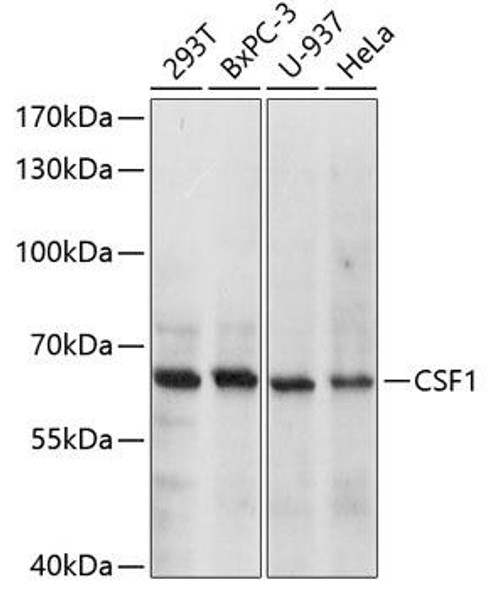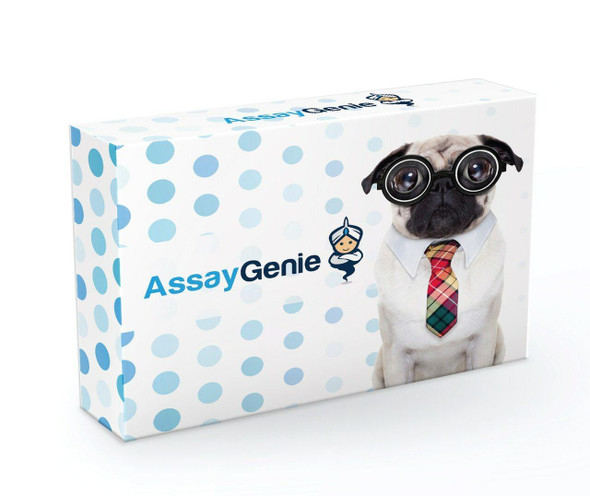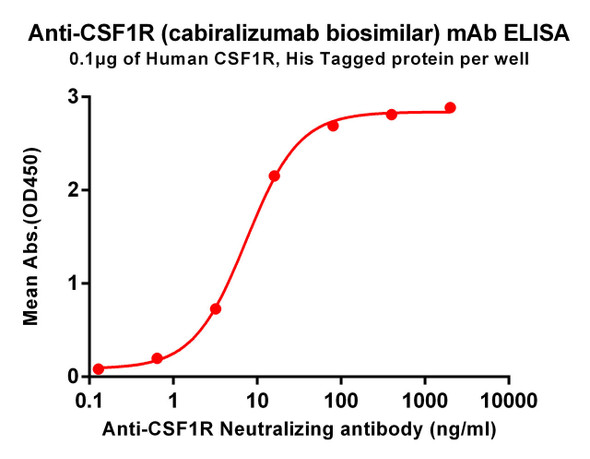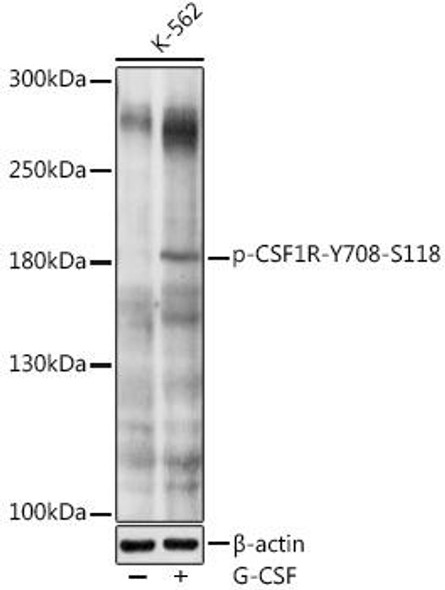Description
Csf1 Antibody (PACO32460)
The CSF1 Antibody (PAC032460) is a valuable tool for researchers studying CSF1, a cytokine involved in the regulation of monocyte and macrophage differentiation, proliferation, and survival. This polyclonal antibody is produced in rabbits and is highly specific for human samples, making it ideal for use in a variety of research applications, including Western blot analysis.CSF1, also known as colony-stimulating factor 1, plays a crucial role in the immune system by promoting the development and function of monocytes and macrophages. Dysregulation of CSF1 signaling has been implicated in a variety of diseases, including cancer, autoimmune disorders, and inflammatory conditions.
By studying the expression and activity of CSF1 using this antibody, researchers can gain valuable insights into the role of CSF1 in these diseases and potentially identify new therapeutic targets.Overall, the CSF1 Antibody (PAC032460) is a powerful tool for researchers investigating the role of CSF1 in immune regulation and disease pathogenesis. Its high specificity and reactivity with human samples make it a reliable choice for studies in immunology, oncology, and other related fields.
| Antibody Name: | Csf1 Antibody (PACO32460) |
| Antibody SKU: | PACO32460 |
| Size: | 50ug |
| Host Species: | Rabbit |
| Tested Applications: | ELISA |
| Recommended Dilutions: | |
| Species Reactivity: | Mouse |
| Immunogen: | Recombinant Mouse Macrophage colony-stimulating factor 1 protein (33-262AA) |
| Form: | Liquid |
| Storage Buffer: | Preservative: 0.03% Proclin 300 Constituents: 50% Glycerol, 0.01M PBS, PH 7.4 |
| Purification Method: | >95%, Protein G purified |
| Clonality: | Polyclonal |
| Isotype: | IgG |
| Conjugate: | Non-conjugated |
| Background: | Cytokine that plays an essential role in the regulation of survival, proliferation and differentiation of hematopoietic precursor cells, especially mononuclear phagocytes, such as macrophages and monocytes. Promotes the release of proinflammatory chemokines, and thereby plays an important role in innate immunity and in inflammatory processes. Plays an important role in the regulation of osteoclast proliferation and differentiation, the regulation of bone resorption, and is required for normal bone development. Required for normal male and female fertility. Promotes reorganization of the actin cytoskeleton, regulates formation of membrane ruffles, cell adhesion and cell migration. Plays a role in lipoprotein clearance. |
| Synonyms: | Macrophage colony-stimulating factor 1 (CSF-1) (MCSF) [Cleaved into: Processed macrophage colony-stimulating factor 1], Csf1, Csfm |
| UniProt Protein Function: | M-CSF: Cytokine that plays an essential role in the regulation of survival, proliferation and differentiation of hematopoietic precursor cells, especially mononuclear phagocytes, such as macrophages and monocytes. Promotes the release of proinflammatory chemokines, and thereby plays an important role in innate immunity and in inflammatory processes. Plays an important role in the regulation of osteoclast proliferation and differentiation, the regulation of bone resorption, and is required for normal bone development. Required for normal male and female fertility. Promotes reorganization of the actin cytoskeleton, regulates formation of membrane ruffles, cell adhesion and cell migration. Plays a role in lipoprotein clearance. Aberrant expression of CSF1 or CSF1R can promote cancer cell proliferation, invasion and formation of metastases. Overexpression of CSF1 or CSF1R is observed in a significant percentage of breast, ovarian, prostate, and endometrial cancers. Aberrant expression of CSF1 or CSF1R may play a role in inflammatory diseases, such as rheumatoid arthritis, glomerulonephritis, atherosclerosis, and allograft rejection. 3 isoforms of the human protein are produced by alternative splicing. |
| UniProt Protein Details: | Protein type:Membrane protein, integral; Cytokine Cellular Component: extracellular space; membrane; perinuclear region of cytoplasm; extracellular region; integral to membrane; plasma membrane; receptor complex Molecular Function:protein binding; protein homodimerization activity; growth factor activity; cytokine activity; macrophage colony stimulating factor receptor binding Biological Process: positive regulation of monocyte differentiation; ossification; macrophage differentiation; immune system process; positive regulation of osteoclast differentiation; positive regulation of cellular protein metabolic process; reproductive developmental process; positive regulation of odontogenesis of dentine-containing teeth; positive regulation of multicellular organism growth; osteoclast differentiation; odontogenesis; cell proliferation; positive regulation of mononuclear cell proliferation; homeostasis of number of cells within a tissue; positive regulation of protein kinase activity; positive regulation of cell proliferation; innate immune response; positive regulation of Ras protein signal transduction; regulation of ossification; inflammatory response; positive regulation of macrophage differentiation; positive regulation of cell-matrix adhesion; positive regulation of cell migration |
| UniProt Code: | P07141 |
| NCBI GenInfo Identifier: | 1345843 |
| NCBI Gene ID: | 12977 |
| NCBI Accession: | P07141.2 |
| UniProt Secondary Accession: | P07141,Q3U395, Q8R3C8, |
| UniProt Related Accession: | P07141 |
| Molecular Weight: | 29,353 Da |
| NCBI Full Name: | Macrophage colony-stimulating factor 1 |
| NCBI Synonym Full Names: | colony stimulating factor 1 (macrophage) |
| NCBI Official Symbol: | Csf1 |
| NCBI Official Synonym Symbols: | op; Csfm; MCSF; C87615 |
| NCBI Protein Information: | macrophage colony-stimulating factor 1; osteopetrosis |
| UniProt Protein Name: | Macrophage colony-stimulating factor 1 |
| Protein Family: | C-C motif chemokine |
| UniProt Gene Name: | Csf1 |
| UniProt Entry Name: | CSF1_MOUSE |










